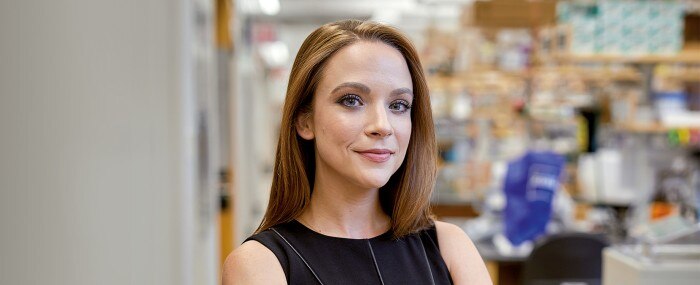メニュー
JP | JPY
-
-
-
- Challenges and Chances: A Review of the 1st Stem Cell Community Day
- Summertime, and the Livin’ Is Easy…
- Follow-on-Biologics – More than Simple Generics
- Bacteria Versus Body Cells: A 1:1 Tie
- Behind the Crime Scene: How Biological Traces Can Help to Convict Offenders
- Every 3 Seconds Someone in the World Is Affected by Alzheimer's
- HIV – It’s Still Not Under Control…
- How Many Will Be Convicted This Time?
- Malaria – the Battle is Not Lost
- Physicians on Standby: The Annual Flu Season Can Be Serious
- At the Forefront in Fighting Cancer
- Molecular Motors: Think Small and yet Smaller Again…
- Liquid Biopsy: Novel Methods May Ease Cancer Detection and Therapy
- They Are Invisible, Sneaky and Disgusting – But Today It’s Their Special Day!
- How Many Cells Are in Your Body? Probably More Than You Think!
- What You Need to Know about Antibiotic Resistance – Findings, Facts and Good Intentions
- Why Do Old Men Have Big Ears?
- The Condemned Live Longer: A Potential Paradigm Shift in Genetics
- From Research to Commerce
- Chronobiology – How the Cold Seasons Influence Our Biorhythms
- Taskforce Microbots: Targeted Treatment from Inside the Body
- Eyes on Cancer Therapy
-
-
-
-
- Challenges and Chances: A Review of the 1st Stem Cell Community Day
- Summertime, and the Livin’ Is Easy…
- Follow-on-Biologics – More than Simple Generics
- Bacteria Versus Body Cells: A 1:1 Tie
- Behind the Crime Scene: How Biological Traces Can Help to Convict Offenders
- Every 3 Seconds Someone in the World Is Affected by Alzheimer's
- HIV – It’s Still Not Under Control…
- How Many Will Be Convicted This Time?
- Malaria – the Battle is Not Lost
- Physicians on Standby: The Annual Flu Season Can Be Serious
- At the Forefront in Fighting Cancer
- Molecular Motors: Think Small and yet Smaller Again…
- Liquid Biopsy: Novel Methods May Ease Cancer Detection and Therapy
- They Are Invisible, Sneaky and Disgusting – But Today It’s Their Special Day!
- How Many Cells Are in Your Body? Probably More Than You Think!
- What You Need to Know about Antibiotic Resistance – Findings, Facts and Good Intentions
- Why Do Old Men Have Big Ears?
- The Condemned Live Longer: A Potential Paradigm Shift in Genetics
- From Research to Commerce
- Chronobiology – How the Cold Seasons Influence Our Biorhythms
- Taskforce Microbots: Targeted Treatment from Inside the Body
- Eyes on Cancer Therapy
-
JP | JPY
Sorry, we couldn't find anything on our website containing your search term.

American Scientist Wins 2019 Eppendorf & Science Prize
news
- 賞
The American scientist Lauren Orefice, Ph.D., Assistant Professor at Massachusetts General Hospital and Harvard Medical School has won the 2019 Eppendorf & Science Prize for Neurobiology for her work on the causes and potential therapies for autism spectrum disorders (ASD).
Dr. Orefice found that peripheral somatosensory neurons – neurons outside the brain that control the sense of touch – are key areas where autism-associated gene mutations have a critical impact. She showed how abnormal function of peripheral somatosensory neurons causes touch over-reactivity and how this over-reactivity during development contributes to altered brain function and some autism-related behaviors in mice. Dr. Orefice’s work changes how we think about the causes of ASD, providing a surprising revision of widely-held views that link ASD exclusively to brain function. She highlights peripheral somatosensory neurons as a possible novel therapeutic target for improving some ASD-related symptoms.
The annual US$25,000 Eppendorf & Science Prize for Neurobiology honors scientists, like Dr. Orefice, for their ground-breaking research. Lauren Orefice is the 18th recipient of this international prize which is awarded jointly by Eppendorf and the journal Science. Researchers who are 35 years of age or younger and have made outstanding contributions to neurobiological research based on methods of molecular and cell biology are invited to apply. The next deadline for applications is June 15, 2020. For more information about Dr. Orefice and the Eppendorf and Science Prize for Neurobiology, visit www.eppendorf.com/prize .
The annual US$25,000 Eppendorf & Science Prize for Neurobiology honors scientists, like Dr. Orefice, for their ground-breaking research. Lauren Orefice is the 18th recipient of this international prize which is awarded jointly by Eppendorf and the journal Science. Researchers who are 35 years of age or younger and have made outstanding contributions to neurobiological research based on methods of molecular and cell biology are invited to apply. The next deadline for applications is June 15, 2020. For more information about Dr. Orefice and the Eppendorf and Science Prize for Neurobiology, visit www.eppendorf.com/prize .
もっと読む
